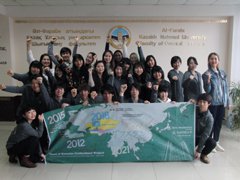Support for Learning Outside the Classroom
Al-Farabi Name Kazakh National University
ONISHI Yumi
As of 2018, there are only three higher educational institutions in Kazakhstan that offer Japanese majors. One is the Eurasian National University in Astana, the capital city, while the other two are the Kazakh Ablai Khan University of International Relations and World Languages in Almaty, the former capital city, and the Al-Farabi Kazakh National University (hereinafter “National University”), where I have been dispatched. During the peak in the late 2000s, Japanese was taught professionally at seven different educational institutions, but due to the lack of job opportunities for Japanese-language speakers, the scale has since declined. The students who study Japanese thus find themselves in isolation with no job prospects and very few opportunities to use the Japanese language outside the classroom. While the visa requirements for visiting Japan have been eased, it cannot be said that many are currently offered the opportunity to actually do so. Accordingly, in this report I will describe my efforts to support learning outside the classroom.
Interaction with Japanese Exchange Students and Trainees
The National University is currently strengthening its academic agreements with Japan, and the number of Japanese schools with such agreements has risen by five in the past two years, for a total of eleven schools. In addition to increasing opportunities for students in Kazakhstan to study in Japan, interaction with Japanese exchange students and trainees is also providing major opportunities to learn Japanese.
The National University is visited by trainees from Japan for language learning and field research in February and March, the spring break period for Japanese universities. During this season, 21 students visited from Bunkyo Gakuin University, with which the National University recently signed an agreement, and the three-day visit consisted of exchange events, a tour of the city, visits to nearby World Heritage sites, and presentations. Second-year students at the National University gathered after class to consider where to visit on the city tour and to create a Japanese guide map containing information on well-known tourist destinations. The guide map also included a basic conversation guide in the local language, and proved popular with the Japanese trainees. From their comments, it was clear that the students were happy to have pleased the trainees through something they planned themselves, and this gave them confidence.
Other activities I implement outside the classroom include interaction with Japanese exchange students and cooking practice. While there are no shops specializing in Japanese foods in Kazakhstan, we do the best we can using ingredients available in Kazakhstan.

Exchange with students from Bunkyo Gakuin University.
*Photo courtesy of Bunkyo Gakuin University.

Making Shiratama (rice dumplings) in the cooking class
The Japan Bowl
The first “Japan Bowl®” quiz competition in Kazakhstan was held in March of this year. This tournament has been held in the U.S. since 1992 under the sponsorship of the Japan-America Society of Washington DC. The Japan Bowl® is now held in 11 countries worldwide, with France and Finland hosting their first in recent years. There was limited time to advertise the 1st competition in Kazakhstan so I was worried about how many people would attend, but in the end, a total of 24 people in 8 teams participated in the preliminary round held in two cities. We avoided setting specific themes for the questions ahead of time so that we could test a wide range of knowledge and imagination. Of the three teams that made it to the main competition, the team of higher secondary school and university students studying Japanese at the Kazakhstan-Japan center for Human Development came in first place by continuously answering correctly. Many of the spectators expressed their strong interest in participating in the next such competition. I hope that the Kazakhstan team is able to proceed to the Tokyo Japan Bowl competition scheduled to take place in 2020.
- What We Do Top
- Arts and Cultural Exchange [Culture]
- Japanese-Language Education Overseas [Language]
- Japanese-Language Education Overseas [Language] Top
- Learn Japanese-language
- Teach Japanese-language
- Take Japanese-Language Test
- Know about Japanese-language education abroad
- The Japanese-Language Institute, Urawa
- The Japanese-Language Institute, Kansai
- Japanese-Language Programs for Foreign Specified Skilled Worker Candidates
- Japanese Language Education for Japanese Children Resident Overseas and for the Descendants of Migrants
- Archives
- Japanese Studies and Global Partnerships [Dialogue]
- JF digital collection
- Other Programs / Programs to Commemorate Exchange Year
- Awards and Prizes
- Publications
